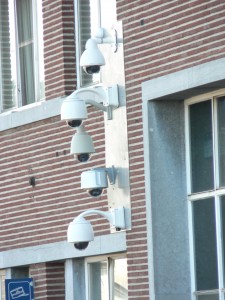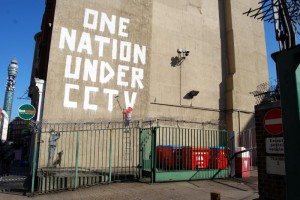Serious Resistance
Features - Posted on Saturday, April 26, 2008 0:04 - 5 Comments
The ever-increasing infringements on civil liberties in Britain, the widespread acceptance of imprisonment without trial, and the rise of the ubiquitous CCTV camera, have seen calls for increased checks on the state’s power.
But what if the state itself is the problem? Otto Nomus discusses serious resistance.
It has become a banal observation that social control in the UK is all pervasive. The liberal media is frequently worked up into impotent fury about some aspect or other of state surveillance, repressive legislation or closure of public space. Broadsheet commentators rail against a government that has gone a bit too far down the road to 1984, without ever mounting any serious opposition to the mindset that has led to these developments in the first place. The liberal position has always been that we, the masses, need a strong state to keep us in line. Forever trying to distance these ideals from the increasingly ugly reality of neoliberalism, apologists for our fucked up system have nothing but fantasies to offer those who resist state control. We are told that we need independent watchdogs to keep the government in line, a strengthening of the powers of the data commissioner, feeble calls for a cap on CCTV development, etc. Anyone with even the most rudimentary of bullshit detectors will realise that these ‘solutions’ are just more of the same, strengthening one arm of the repressive state to keep the other arm in check. What none of these commentators dares to suggest is that it might be precisely this excess of policing that is the problem in the first place. From Liberty to The Guardian to David Cameron, the consensus is that the police will be empowered to watch over us, and take strong action where necessary. None of these twittering corporate flunkeys have anything to offer to those who want to be free of this shit for good.
From council CCTV in the Market Square, to the all pervasive surveillance culture encouraged by Facebook, it feels like our every move is being watched and recorded somewhere. Those who might want to do something subversive and spontaneous are in constant fear that such acts will not go unnoticed and will be archived in a file somewhere, labelled with their name, biometric details and national insurance number.
With a National Identity Register on the cards we can be certain that there really will be a centralised file on everyone in the next few years. Whilst we can
only dream of having some of the freedoms people of previous generations had, it seems likely that future generations will look back on what we have now with envy. It seems essential that we use what little free space is available to us to fight against the rising tide of authoritarianism, and attack it at its foundations.
 The drive for social control, that is made flesh in the ubiquitous cameras, the crackdowns on demonstrations and the snooping of email and phone communications, originates in the hierarchical organisation of society. Capitalist ideology, enacted through the state and the corporation, results in the stratification of society, such that a few profit from the immiseration of the many. This relationship would be incredibly unstable were it not for the massive powers of social control and manipulation that are wielded in order to enforce and justify this arrangement. Having armies and police to smash those who take issue with these economic and social relations helps to prop up this unbalanced system. So too does control of the mass media that ends up influencing how we view these relations. Those who oppose the parasitic forces that rule in our society have to fight both the culture that idealises the status quo and the apparatus that defends it. The battle against social control takes place on these fronts.
The drive for social control, that is made flesh in the ubiquitous cameras, the crackdowns on demonstrations and the snooping of email and phone communications, originates in the hierarchical organisation of society. Capitalist ideology, enacted through the state and the corporation, results in the stratification of society, such that a few profit from the immiseration of the many. This relationship would be incredibly unstable were it not for the massive powers of social control and manipulation that are wielded in order to enforce and justify this arrangement. Having armies and police to smash those who take issue with these economic and social relations helps to prop up this unbalanced system. So too does control of the mass media that ends up influencing how we view these relations. Those who oppose the parasitic forces that rule in our society have to fight both the culture that idealises the status quo and the apparatus that defends it. The battle against social control takes place on these fronts.
On the one hand we must attack the culture that insists that the state has benign intentions. So often are we told that ‘they’ only want to root out the anti-social elements and the terrorists, that many of us have started to believe it. The truth is that the state wants to smash or discipline all of its enemies. The first response of many people to arguments against social control is that “If you’ve got nothing to hide, you’ve got nothing to fear.” The attitude seems to be that the state is inherently incorruptible and has our best interests at heart so shouldn’t
we just let them get on with it? This conditioned reflex is a very dangerous one that needs to be overturned before we find ourselves at the gas chamber door, still convinced that it is all for the greater good. The culture of our society is one that is saturated with the ideas of those who run it. These ideas must be debunked and subverted in order to liberate ourselves from their yoke.
On the other hand, we will have to disarm the state’s policing of our actions. Whether it be through deactivating security cameras and stealthily sabotaging police operations, or resisting our arrest and suppression through more confrontational means, we won’t change society until we can shake off the repression of our movements. We will have to engage in subversive activity, whether it is squatting to create autonomous spaces, rioting to keep the police out, or hiding our friends from the authorities. Anyone who claims to be able to change society without
confrontation is kidding themselves. To survive, radical social movements have to vigorously defend their oxygen supply of free space. Otherwise they get snuffed out.
The most successful autonomous cultures have been those who have most successfully resisted their repression. This has not come about through people sitting back and pretending that they can just carry on doing what they’ve always done, a mindset that seems prevalent in the UK activist scene, but in constantly adapting to and responding to their movements’ ideological and physical enemies. Whether it is the Zapatistas creating autonomous communities outside the state in rural Mexico, the squatters movements liberating urban spaces, or Greek anarchists trashing CCTV cameras, there are many movements that are making serious attempts to live outside social control that we can learn from. Let’s not wait a moment longer before resisting.
5 Comments
stanwolf
M
Very Derrida.
nobhead
stanwolf – your take on the problems of state control seems to be entirely divorced from reality. cctv cameras are created by tyrannical power for the purpose of maintaining it. if you can give a practical example of how cctv has a ‘mode of being’ antagonistic to the state i will take my hat off to you but you can’t because there isn’t one, like a cage doesn’t have a ‘mode of being’ aligned with freedom. this article is concerned with a practical problem – how to avoid the recuperation of political action through the channel of liberalism – and provides an alternative path, with a few examples. your theory may have a lot of sexy concepts in it but you need to provide examples of what it actually means if you want anyone to take you seriously.
Conor
I’ve got nothing to hide, but I still don’t want to tell everyone about my life because mystery is interesting.
CCTV facilitates boredom.
“Resistance bands recruit the ‘stabilizer’ muscles – this muscle group is significant because it supports our larger muscles and joints when we move, and helps reduce the risk of injury. So they are a safe and low-impact option for older people, and are often used for rehabilitation.”



Though I concur with some of the points outlined here I take issue with the approach since it does not nuance technology, and it is this unidirectional thinking that underlies much of the argument. No single meaning or political power can be invested in technology, the cited examples of CCTV (i.e. cameras) and Facebook are both astonishingly complex systems that produce many varied modes of being: some are aligned with state control, others antagonistic to it. Theoretically all structures, objects and processes contain within them their other and thus it is not ever a matter of replacing one system with another, rather each is always already in place. What is at stake is the constant troubling of the dominant structure, object, or process such that it never becomes ‘truth’ or as you say ‘the greater good’. To simply destroy an object, such as CCTV, is to render the possibility of its displacement impossible. One does not destroy to begin again, one is in a constant process of beginning. We should examine those beginnings, support and nurture them from within such that they flourish, and when they do, we should find new beginnings within those: anarchism cannot simply replace the dominant structure and rid itself of the tainted tincture of capital, rather more, each has within it the other; we can never be with(out) them.